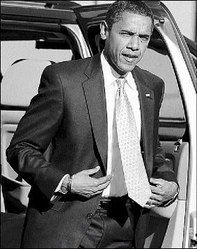Obama stimulus plan jumps major hurdle
Published: Tuesday | February 10, 2009

President Barack Obama - AP
WASHINGTON (AP):
The economic stimulus legislation backed by President Barack Obama has passed a key test in the Senate, over strong Republican opposition.
The vote late Monday was 61-36, one more than the 60 needed. The $827 billion bill is expected to pass through the Senate today.
The next step would be negotiations with the House on a final compromise. Democratic leaders want to get the bill to the president's desk by the end of the week.
Obama was participating in a town hall-style meeting in Elkhart, Indiana and plans to hold another today in Fort Myers, Florida, and one Thursday in Peoria, Illinois, two cities suffering particularly hard times. He was scheduled to hold his first prime-time news conference last night.
The public appearances come as Obama plunges into a difficult challenge early in his leadership, struggling to get a divided Congress to agree on his economic recovery package while pitching a new plan to ease loans to United States consumers and businesses.
Job losses
"We can't afford to wait. We can't wait to see and hope for the best," Obama said in Elkhart, a community reeling from job losses. "We can't posture and bicker and resort to the same failed ideas that got us in into this mess in the first place."
Obama and Democratic Party leaders had hoped to have a bill ready for the president's signature by February 16, a deadline that grows more challenging by the day.
"You know, look, it's not perfect," the president conceded. "But it is the right size, it is the right scope. Broadly speaking, it has the right priorities to create jobs that will jump-start our economy and transform the economy for the 21st century."
At the Treasury Department, Secretary Timothy Geithner delayed the unveiling of a new bailout framework for financial institutions from Monday to Tuesday to let the administration focus on the stimulus legislation.
Accountability rules
Geithner is considering steps to broaden the use of a new lending facility at the Federal Reserve, provide government guarantees to help banks deal with their troubled assets, and continue direct infusion of capital into banks in exchange for securities and tougher accountability rules.
Amid the urgency created by nearly 600,000 new unemployed workers last month and new bank failures, Obama's economic prescriptions are coming under critical scrutiny by both Congress and the American public.

















